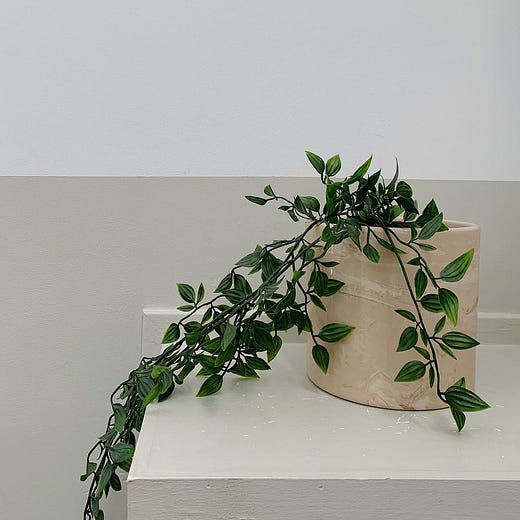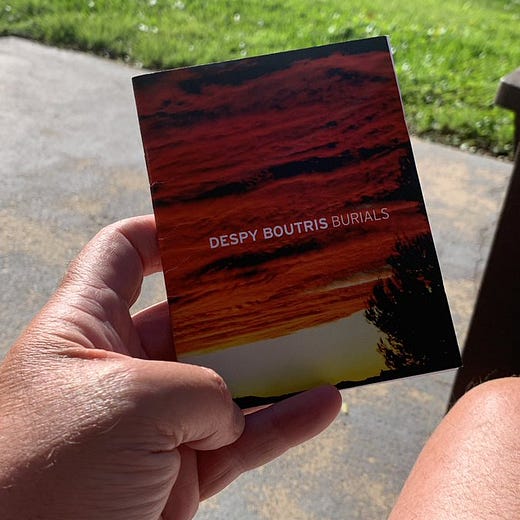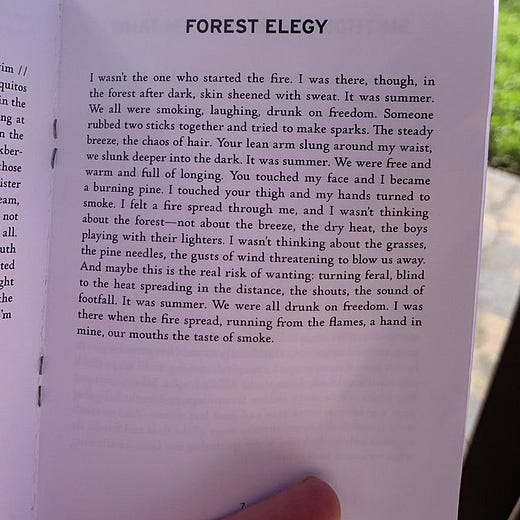on friendship
& news, quotes, book recs, etc.
Happy Wednesday, folks!
I’ve got a long newsletter for you today! Please open this email in a new window if you want to read through to the end.
Here’s what I have for you:
Housekeeping
News
Reading recs
What I’m reading
Quotations
On friendship
Tweets
Housekeeping:
I went to AWP last week & had so much fun seeing my friends. Here are some photos!
& I have a new poem out today.
My fiction collection is officially out!
You can purchase a *signed* copy here.
What I read last week:
slow and soft and righteous: improvising at the end of the world (and how we make a new one), Sonia Louise Davis
All We Ask is You to Be Happy, Angie Sijun Lou
To read:
Quotations:
To allow oneself to feel is the definition of vulnerability.
It is amazing how the death of someone you love exposes this lie you tell yourself, that there’ll always be time.
I live in the slippage.
-Angie Sijun Lou
I know some words / that cannot be translated // such as my name and the light that spills, / confessing the ecology of cypress trees, fog slathered on a beach.
-Angie Sijun Lou
The immigration officer asks / for my Proof of Birth // and I say, here I am, proof that I was born.
-Angie Sijun Lou
Let me tell you what I know about exile— / how it begins with elegy and ends with elegy.
-Angie Sijun Lou
What I want is direct and unmediated access to the real.
-Angie Sijun Lou
The idea of dying doesn’t scare me but the ocean does.
-Angie Sijun Lou
In Chinese, the word for mercy translates to my heart hurts for you.
-Angie Sijun Lou
Already I’ve forgotten / my past incarnations.
-Angie Sijun Lou
we’ve got to stop setting up this opposition between doing and thinking, as if thoughtfulness required no verb, no work.
-Sonia Louise Davis
I was always most interested in what was happening / outside the frame of the picture.
-Sonia Louise Davis
On friendship:
I have been thinking a lot about friendship lately. The last newsletter was about envy (and addressed the fact that, sometimes, we find ourselves being jealous of friends)—and, this week, I’m writing about friendship more broadly.
As I get older and friendships either maintain or dwindle, reciprocity has become increasingly important to me in terms of my decisions to ~keep~ friends or let them go.
Of course, it’s normal for people to adjust their priorities as we grow up. A few weeks ago, I was expressing my frustration to my mom over (many) people constantly prioritizing their significant other over their platonic friends. She, ever the Capricorn, did not mince words: It will always be like that, so you’d better get used to it.
In her article IT’S YOUR FRIENDS WHO BREAK YOUR HEART, Jennifer Senior writes:
I still have sense-memories of how sickened I was when this friend told me I’d been relegated to a lower league—my heart quickening, the blood thumping in my ears.
I mean, mood.
For me, regardless of who I’m dating or not dating, my friends are always at the top of my list of priorities, and I cherish those friends who feel the same way. I cherish that sense of reciprocity—as do most of us:
Then there was the friend who didn’t say anything hurtful to me per se; the problem was how little she said about herself at all. According to Hojjat, failures of reciprocity are a huge theme in broken friendships. That stands to reason—asymmetries of time and effort can continue for only so long before you feel like you’ve lost your dignity.
Here are some more quotations I liked from the article:
Most of my withered friendships can be chalked up to this terrible tendency of mine not to reach out. I have pals in Washington, D.C., where I started my professional life, whom I haven’t seen in years, and friends from college I haven’t seen since practically graduation—people I once adored, shared my life with, couldn’t have imagined living for two seconds without.
And yet I do. I have.
This is, mind you, how most friendships die, according to the social psychologist Beverley Fehr: not in pyrotechnics, but a quiet, gray dissolve. It’s not that anything happens to either of you; it’s just that things stop happening between you. And so you drift.
Practically everyone who studies friendship says this in some form or another: What makes friendship so fragile is also exactly what makes it so special. You have to continually opt in. That you choose it is what gives it its value.
In the most stable friendships, people tend to stand up for each other in each other’s absence; trust and confide in each other; support each other emotionally; offer help if it’s required; try to make each other happy; and keep each other up-to-date on positive life developments.
The problem is that when it comes to friendship, we are ritual-deficient, nearly devoid of rites that force us together. Emily Langan, a Wheaton College professor of communication, argues that we need them. Friendship anniversaries. Regular road trips. Sunday-night phone calls, annual gatherings at the same rental house, whatever it takes. “We’re not in the habit of elevating the practices of friendship,” she says. “But they should be similar to what we do for other relationships.”
When I consider the people I know with the greatest talent for friendship, I realize that they do just this. They make contact a priority. They jump in their cars. They appear at regular intervals in my inbox. One told me she clicks open her address book every now and then just to check which friends she hasn’t seen in a while—and then immediately makes a date to get together.
Tweets:
Hope you have a great week—
-Despy Boutris


















